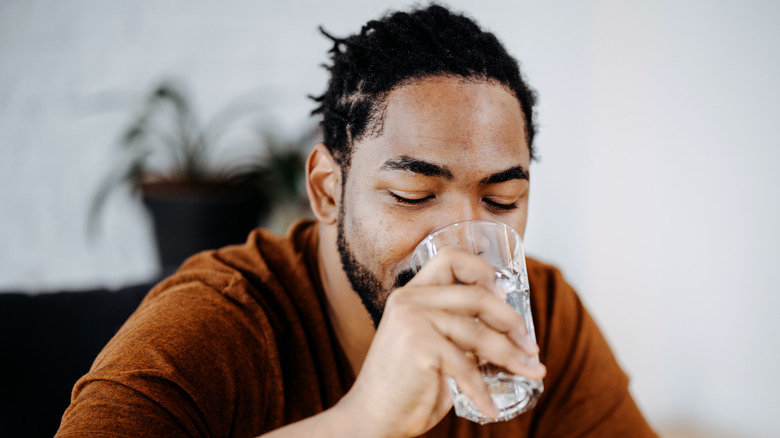You Should Drink Water Before A Blood Draw (And Here's How Much)
The body requires water on a daily basis, but hydrating is even more critical prior to getting blood work done. "If you're having blood drawn, unless you've been told not to eat or drink anything by your provider, make sure you are well-hydrated," NorthBay Healthcare's Director of Laboratory Services Jerry Simmers told NorthBay Health.
So why is drinking water such an important part of the blood-draw process? Essentially, it makes the phlebotomist's job much simpler. The reason is that water makes our veins more visible to the eye — and therefore easier to get to. No more searching around for hard-to-see veins. And as an added incentive: the more effortless the appointment is, the faster you're able to get in and out as a patient.
So just how much water should you load up on before your appointment? Even more, what are some other ways a person can help ensure a smooth procedure?
Drink an extra glass of water right before your appointment
Patients often need to fast before having blood drawn, because their test results may not be accurate otherwise, cautions Cleveland Clinic. This means that a person should not eat or drink for 10 to 12 hours before their appointment. This includes black coffee, which will exacerbate fluid loss due to increased urination. To make things easier, consider scheduling your procedure during morning hours so the fasting takes care of itself as you sleep. The exception to this rule, of course, is usually water.
You'll want to start zeroing in on your water intake the day before getting blood drawn. Phlebotomy Training Specialists suggest sticking to 64 ounces in a day, topping that off with a 16-ounce glass of water right before the appointment. In some cases, however, even water may not be permitted beforehand, so be sure to consult with your phlebotomist so you can properly prepare.
While pre-blood work hydration is certainly important, so is hydration after the fact. Therefore, don't neglect your fluid intake as soon as your appointment is over.
Keep hydrating after you've had blood drawn
After your appointment, up your liquid intake even more over the course of the next four hours, reports Phlebotomy Training Specialists. Be sure to eat, but stick with a light meal rather than anything too heavy. Additionally, you won't want to smoke or drink alcohol after your appointment. Lastly, keep an eye on your arm to ensure it stays clean and dry. You can take off the gauze covering after a couple of hours. If the site continues to bleed, be sure to lift your arm up above your head and apply mild pressure to the affected area. Speak to your doctor if you feel ill.
But wait a minute — what if you've completed your appointment, but realize after the fact that you accidentally ate something prior to getting blood drawn? Reach out to your doctor. If your blood work shows no abnormalities, there's likely no reason to retest, according to Cleveland Clinic. Otherwise, your physician may suggest that you have your blood drawn again after you've properly fasted to ensure the most accurate results. Remember, unless instructed otherwise, you should just stick with water.



